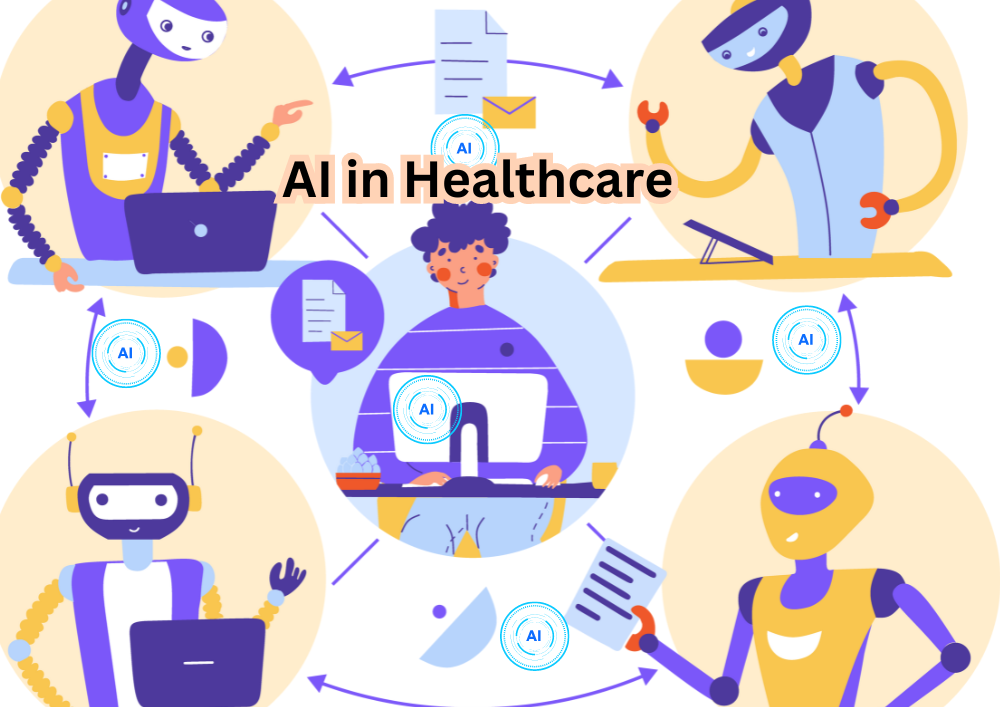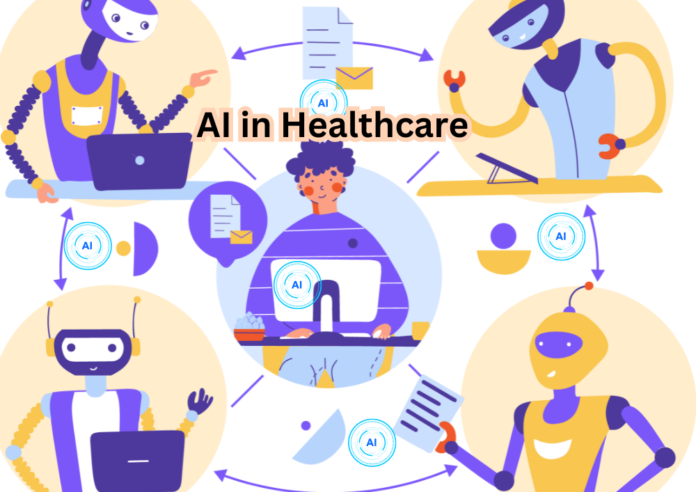The Important Transformation of AI in Healthcare
Over the last few years, the merging of AI with healthcare has turned into an important change in the medical arena. Healthcare professionals and organizations are more widely recognizing the ability of artificial intelligence to optimize patient care, smooth workflows, and improve health results. Our commitment at Marooth is to understand the diverse roles and implications of AI in healthcare, aiming to use its power to create better health solutions.
What is AI in healthcare and how does it operate?
AI in healthcare consists of a variety of technologies, which include machine learning, natural language processing, and robotic process automation, all built to improve the efficient analysis and interpretation of medical data. These technologies give healthcare providers the ability to make educated choices, improve patient care, and refine their operations.
The Role of AI in Healthcare

1.Data Management and Analysis
A major duty of AI in healthcare is its skill in processing huge datasets. Analyzing information promptly and exactly, AI algorithms provide important insights that augment clinical decision-making, from electronic health records (EHRs) to imaging data. Healthcare providers have the opportunity to focus more intently on patient care when they improve their data management.
2.Enhancing Diagnostic Accuracy
Diagnostic practices are witnessing a revolution because of AI. Models based on machine learning are able to recognize patterns seen in medical images, leading to quicker and more accurate diagnosis. Such as, AI algorithms are able to identify early symptoms of diseases including cancer, which supports timely response and superior patient results. This feature is key to better survival statistics and bettering the overall quality of health care.
3.The Future of Prediction for Better Results
Using historical patient data and predictive analytics powered by AI, one can predict upcoming health risks. Healthcare providers can execute preventive actions early for those patients showing heightened risks for conditions like diabetes, heart disease, or mental health problems. Taking this proactive approach saves lives as well as reduces future healthcare costs.
4.Optimizing Administrative Processes
Healthcare administrative obligations can slow down the quality of patient care. The automation of activities, including appointment scheduling, billing, and insurance claims processing by AI, frees up healthcare practitioners to concentrate on their direct interaction with patients. This greater efficiency enhances the satisfaction levels of patients and better the overall experience.
Examples of Artificial Intelligence in Healthcare in the Real World.
1.IBM Watson Health
IBM Watson Health is a major illustration of health AI that harnesses broad data sets to power personalized recommendations for treatment. Using medical literature and patient data analysis, Watson helps oncologists decide on the optimal approach for treating cancer.
2.Google DeepMind
The systems developed by Google DeepMind can analyze medical images with extraordinary accuracy. For example, its algorithms succeed in finding eye diseases through retinal scans, attaining performance degrees that are better than those of human experts. This development is important for both early intervention and bettering patient care.
3.Aidoc
Aidoc provides AI solutions for radiology, which allows radiologists to label critical cases in real time by detecting abnormalities. Aidoc increases the quality of patient care and streamlines workflows in healthcare settings by making sure urgent situations get quick attention.
Using AI in the Medical Field.
Telemedicine
Telemedicine has revolutionized the nature of conversations between patients and those who provide care. AI plays an important part in this sector by enabling remote monitoring and virtual consultations. AI algorithms, through their analysis of wearable device data, can signal any irregular changes in a patient’s health situation to healthcare providers. This capability improves both access and the quality of care.
The abbreviation for Clinical Decision Support Systems is CDSS.
AI powered Clinical Decision Support Systems supply healthcare professionals with recommendations backed by research during interactions with patients. These systems improve decisions and ensure better patient safety by merging patient information with existing medical knowledge. They are also valuable in help reducing the chance of misdiagnosis and incorrect treatment.
Robotic Surgery
The transformation of surgery is coming from AI technologies. Robotic systems for surgery that include AI can improve accuracy and control throughout procedures, leading to smaller cuts, less time for recovery, and better outcomest for patients. The accuracy of performing complex operations has increased for surgeons, therefore lowering the risks typically associated with traditional surgery.
Personalized Medicine
The use of AI drives the growth of personalized medicine by examining genetic and phenotypic information to customize treatments for patients. The use of a targeted approach makes certain that patients obtain the most successful therapies that match their unique features, improving both treatment success and patient happiness.
The Use of AI in Healthcare: Challenges and Considerations
While the benefits of AI in healthcare are substantial, several challenges must be addressed to realize its full potential:
Data Privacy and Security
The use of sensitive patient information creates important concerns about privacy. In order to protect the confidentiality of patient data, healthcare organizations must create substantial data protection protocols against breaches and unauthorized access. HIPAA compliance is important in order to maintain patient confidence.
Bias in AI Algorithms
The training data can lead to bias within AI algorithms. Deliberate distortions in the past dataset can lead AI to maintain these biases while making clinical decisions. For the delivery of care that is unbiased for everyone, it’s crucial to secure fairness and equity in AI applications.
Combination of Current Systems
Healthcare organizations across the board are challenged in merging AI solutions into their present systems. Easy integration is necessary for the full benefits of AI technologies to shine through in operational tasks. In order to deploy AI successfully, organizations must make investments in the essential infrastructure along with the needed training.
The Potential for AI in Healthcare.
The future of AI in healthcare is promising, with several trends anticipated to shape the industry:
Increased Collaboration
There will be a strengthened cooperation between AI technologies and healthcare experts. AI is going to be a crucial partner, enriching clinical talents while valuing the human element associated with care. The partnership will achieve both better health results and better patient interactions.
Regulatory Developments
With the continuous development of AI technologies, authorities will develop regulations to oversee their secure and ethical deployment in healthcare. These changes will stimulate innovation and simultaneously emphasize both patient safety and data reliability.
Wider Use of AI Solutions
With the growing recognition of AI’s benefits by healthcare providers, multispecialty widespread adoption is likely to happen. In both diagnostics and treatment planning, AI will become a fundamental part of healthcare provision.
Conclusion
The adoption of AI in the healthcare industry isn’t just technical progress; it indicates a basic redefinition of care delivery. We have made a commitment at Marooth to tap into AI for improving healthcare performance, optimizing operational efficiency, and fueling innovation. In thinking about the future, adopting AI will be crucial for developing a healthcare system that is more efficient and focused on patients.
Understanding the prospects and hurdles of AI in healthcare allows us to better arrange for a future in which technology and human expertise combine to achieve superior care for patients. We are justembarking on a journey to incorporate AI into healthcare, and at Marooth, we are enthusiastic to be involved in this transformative journey.




